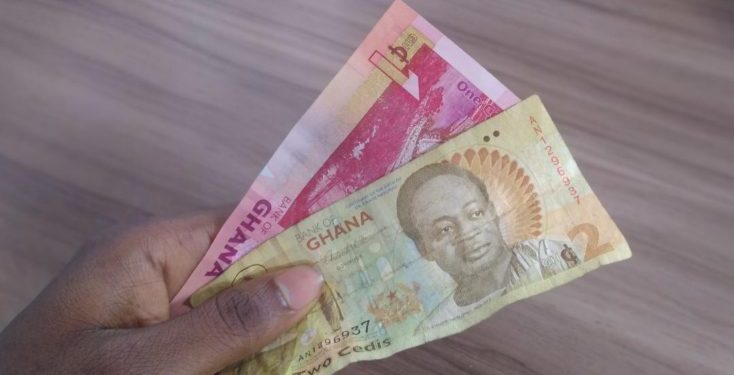Is it prudent to phase out the Ghs 1 and Ghs 2 currency notes and use their respective coin equivalents?
The cost of printing a unit of a currency note could be higher than the face value of the currency. Thus, it is comparatively true that a lot of money goes into printing currencies, especially lesser denomination banknotes that tend to circulate more in an economy like Ghana’s.
Dr. Ernest Addison, Governor of the Bank of Ghana (BoG), made known recently that the GH₵ 1 and GH₵ 2 banknotes would eventually be phased out for the usage of their respective coin equivalents because these banknotes are not cost-effective in terms of the printing cost.
Considering the trade-off between the cost of printing money and the longevity of banknotes in circulation, it is fairly economical to use coins instead of banknotes because coins are relatively durable.
Contrary to the uproar among the citizenry about the Bank of Ghana eliminating GH₵ 1 and GH₵ 2 from the payment system, it is worth stating clearly that the central bank only intends to replace these banknotes with their respective equivalents in coin. Picking a few comments on social media alone casts a shadow on this intended move by BoG.
Citing Dr. Addison on the cost of printing new banknotes to replace defaced ones, and the use of coins due to their durability, implies a reduction in the frequency and the cost of replacing these defaced banknotes as this could yield savings to the government.
If cost justification is the one major reason to transition low-denomination banknotes to coins, then one might ask, is this a prudent decision? Would the pros outweigh the cons of replacing these banknotes with coins in the payment system? I guess not.
The cost of using coins could be very high for consumers and businesses. How? Considering the education standards in the country and the mentality toward coins, this plan could cause a lot more harm than the intended good.
A typical Ghanaian would usually register some displeasure or even reject coins as change from transactions instead of banknotes, especially when in large quantities. This reveals how we place little value on coins as a people. Coins are relatively cumbrous to banknotes and thus, somewhat perceived as a nuisance.
You could imagine the hurdles a mobile banker or ‘susu’ collector would have to overcome in transporting heavy coins contributed by customers of a financial institution as savings, and the high cost of acquiring coin-handling equipment by institutions and businesses in a bid to adjust.
Read: World Bank says FDI inflow to Ghana declined to $2bn in 2020
Also, a study in the United States by the National Association of Convenience Stores revealed that counting pennies could add 2.5 seconds to each transaction, revealing how significantly productivity could diminish in the long run.
With a strong preference for banknotes, replacing the GH₵ 1 and GH₵ 2 banknotes with coins would reduce and eventually halt transactions involving these denominations and as a consequence, a shift in basic prices of commodities to or towards the least currency note in circulation, the GH₵ 5 note.
This would translate to inflation and aggravating the standards of living for citizens. It is said that; “the value is the same”, yet the 2007 re-denomination of the cedi saw prices of items like a ball of kenkey that was sold at ₵ 1,000(old Cedi) selling for GH₵ 1.00 (₵ 10,000) instead of the GH₵ 0.10 (₵1,000) after a period. Arguably, this could be attributed to the transitioning of those banknotes to coins.
With the demand for money largely being psychological, the neglect for these coin equivalents would have the pressure transferred to the GH₵ 5 notes and eventually get them defaced due to their wide circulation and hence, would need replacement too. With the incidence of this, are we going to replace the GH₵ 5 note with a coin too and therefore, get trapped in a vicious cycle?
Maybe, the whole Nation’s cash payment system should comprise coins only since it would be the most cost-effective decision.
Alternatively, transitioning to a cash-lite economy could be the best remedy and it is worth noting that this plan could fast-track such a move which is in the offing but do we have the education and innovation required for a cash-lite economy yet?
We should be looking at changing the materials used in printing these banknotes. Instead of paper-based substrates, we could use polymer substrate banknotes. Banknotes made from Biaxially Oriented Polypropylene (BOPP) as an alternative are comparatively durable and would be cost-effective to print and replace in the long run. Also, this material is recyclable and eco-friendly.
Citing Dr. Addison on the difficulty in processing defaced banknotes by the currency processing machines, could we be using obsolete and inefficient currency processing technologies?
Could there be banknotes fit for re-circulation in the bales of GH₵ 1 that these machines are unable to process? According to a Staff Working Paper by the United States Division of Reserve Bank Operations and Payment Systems, the longevity of the $1 note in circulation increased from an average of 18 months to 70 months (i.e. 288.8%) due to advancements in currency processing technologies and improved policies.
Hopefully, a change in the material used in printing the banknotes of these highly-circulated denominations coupled with an advancement in the currency processing technologies and revision of monetary policies could go a long way in saving the government some money and maximizing the welfare of the ordinary Ghanaian.








